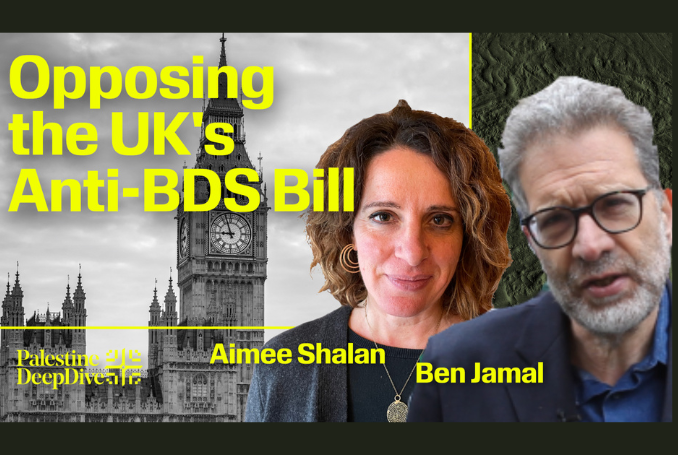
By Omar Aziz
In 2018, PSC successfully challenged the government in the UK’s Supreme Court resulting in those regulations being overturned, on the basis that the government did not have the legal grounds to introduce these regulations
With the UK government announcing that it will press ahead to pass its long-anticipated ‘Anti-BDS Bill’, this week Palestine Deep Dive’s Mark Seddon speaks with two British Palestinian campaigners, Aimee Shalan and Ben Jamal. Shalan is co-director of Makan and chair of the British Palestinian Committee (BPC) and Ben Jamal is director of the Palestine Solidarity Campaign (PSC).
The Economic Activity of Public Bodies bill, which was given its first reading in parliament on June 19th, is due to be debated in the House of Commons in the first week of July. Its stated purpose is “to prevent public bodies from being influenced by political or moral disapproval of foreign states when taking certain economic decisions”. In other words, it will prevent public bodies (e.g. universities and local councils) from divesting from companies and organizations found to be complicit in Israeli crimes against Palestinians.
But at a time when Israel further entrenches its settler-colonialism and apartheid by the day, killing Palestinians at an unprecedented rate, shooting journalists, expanding its illegal settlements, demolishing Palestinian homes, and upholding its besiegement of millions of Palestinians in the open-air prison of Gaza, this bill is being widely interpreted as an attempt by the UK government to maintain Israel’s impunity in the face of growing solidarity with Palestine.
The call for Boycott, Divestment and Sanctions (BDS) was formally launched in 2005. Shalan explains, “it was a call from Palestinian civil society organizations, and that included unions, women’s organizations, refugee networks, and Palestinian citizens of Israel.”
Inspired by the case of South Africa, BDS “calls for the ending of Israel’s occupation and colonization of Palestinian lands and the dismantling of the wall, the recognizing of fundamental rights of Palestinian citizens of Israel to fully equality and also respecting, protecting, and promoting the rights of Palestinian refugees to return to their homes and properties as stipulated in UN Resolution 194.” Despite frequent mischaracterizations of BDS, Shalan stresses that “there’s nothing dangerous about it. It’s about upholding the laws that Britain supposedly supports. I think it’s a very simple tool in order to bring about freedom, justice, and equality.”
Jamal explains how this bill must be understood “in the context of a government that’s bringing a whole range of repression measures designed to suppress broadly, not just in relation to Palestine” but a host of other bills such as a draconian policing bill and also legislation concerning the right for workers in the UK to go on strike. The bill also comes within the wider context of “the effort by Israel and its allies to silence Palestinian voices” and BDS in particular. This bill, Shalan agrees, is the latest in a widespread campaign to repress and censor Palestinians advocating for their rights. “This is a very difficult time politically where there is a very toxic environment where Palestinians are being silenced in every sphere.”
The significance of the timing of this bill was also illuminated by the panel with it being tabled during the 75th anniversary of the ongoing Nakba against Palestinians which began in 1947-48, when over 750,000 Palestinians were ethnically cleansed from their homes to make way for Israel’s creation, and amid the current Israeli onslaught against Palestinians which has seen over 170 killed in the occupied West Bank and Gaza, including 26 children, since the begging of the year. 2023 has seen the highest number of Palestinians killed by Israeli forces and government-backed settlers since the end of the Second Intifada, following the election of the current far-right Israeli government.
Jamal emphasizes how to be passing this bill at any time in the previous decades would be wrong but to do this “at a time when Israel is ramping up its violent imposition of apartheid” makes this move by the UK government particularly egregious.
On top of this, major international human rights organizations including Human Rights Watch and Amnesty International, as well as the Palestinian human rights group Al-Haq and leading Israeli human rights groups B’Tselem and Yesh Din, have all concluded that Israel is committing the Crime of Apartheid through its systematic oppression and domination of the Palestinian people, something Palestinians have been saying for decades. The UK’s ruling Conservative government and the Labour Party opposition both reject the findings of these reports.
However, the bill has also provoked a backlash across broad sections of civil society. “We’ve got nearly 70 organizations that have come together,” says Jamal. “Climate justice groups, Greenpeace, Friends of the Earth, more than a dozen trade unions, faith groups, the Quakers, the Methodist Church, the United Reform Church, the Muslim Association, the Britain and the Jewish Diaspora Alliance. A whole range of organizations, Liberty, who are coming together because they see this as a bill that targets a whole range of campaigns for justice that is a threat to freedom of expression and is a threat to local democracy.”
Refusing to be deterred, Shalan makes clear how it is “all the more essential that we come together as a group and that we make ourselves heard” adding, “we’re not willing to be silenced!” Already looking ahead, Jamal explains that, if the bill goes through, it will not be the end of the story as PSC and others will seek new ways to challenge it. “There will be other ways in which we look, including the potential for legal action to stop this bill actually having impact and having effect”.
Highlighting the role of Michael Gove, the current Secretary of State for Levelling Up. Housing and Communities and the sponsor for the Bill, Jamal says, “Gove has an ideological commitment to this piece of legislation” but also that this pledge to ban public bodies from boycotting Israel was a commitment made in the 2019 Conservative Manifesto. The introduction of this bill has been long anticipated even before that. As Jamal explains, the British government made a previous attempt to outlaw BDS in 2016-17 by introducing “regulations attached to pension law that would have stopped local government pension schemes from divesting from companies that were complicit in the violation of international law, all designed to shield Israel from accountability.”
In 2018, PSC successfully challenged the government in the UK’s Supreme Court resulting in those regulations being overturned, on the basis that the government did not have the legal grounds to introduce these regulations. Therefore, this bill from the government “is its answer to that. It is giving itself the power by introducing prior legislation,” says Jamal.
But the attempt to outlaw peaceful protest inspired by the successful boycott campaigns against apartheid South Africa is not isolated to the UK. Similar attempts have also been seen across several European states including France and Germany which have overseen police crackdowns on marches in support of Palestinian human rights in France, banning of commemorations of the anniversary of the Nakba in Germany, and the German Parliament voting to condemn the BDS Movement as ‘antisemitic’ in 2019. Despite huge opposition, including from many Jewish groups, the repression in Germany has been so widespread that some Palestinians have argued that it has become, in effect, illegal to be Palestinian in Germany.
In the United States, over 30 US states have passed laws that proscribe support for BDS, with many making workers sign a pledge declaring that they will not support BDS, and others which threaten to withhold funding from any institution that divests from companies they believe to be complicit in Israel’s crimes against Palestinians. This comes on top of attempts by Israel and its supporters to blur the distinction between anti-Zionism and antisemitic and to smear anybody who supports Palestinians as antisemitic.
(Palestine Deep Dive)







